
Babel of Tongues ©
"The Lord did there confound the language of all the earth." Genesis 11:9
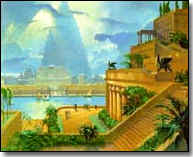 "Let us build us a city and tower, whose top may reach unto heaven." Genesis 11:4
"Let us build us a city and tower, whose top may reach unto heaven." Genesis 11:4
Following the melt down of the Ice Age, the hunting and gathering economy of the Mediterranean region collapsed. A period of chaos and struggle resulted from the collapse of the old economy. Out of that period of chaos and struggle, a great enlightened leader arose. That was Assur. Assur and his descendants conquered a vast region of the ancient world. They established a far-flung empire of related kingdoms. Those were the first agrarian civilizations. Those groups who opted for agriculture as an alternative to hunting and gathering were the survivors who established the new world order of agrarian civilizations. Agriculture is still the foundation of the world economy.
Those of our ancestors who founded the first agrarian civilizations inherited a world of wild plants, wild animals, wild men, and wild languages. Assur's prehistorical empire was an empire of many tribes, nationalities and languages. They set about the process of domesticating plants, animals, people, and languages. The languages we speak today did not "evolve" from primitive languages. Our languages are domesticated languages.
 According to the legend of Assur in the foundation legend of Egypt, it was Thoth who "first taught men to speak clearly." According to the legend, after Assur had raised his own people up from savagery and ignorance, he went about teaching the arts of civilization to the rest of the world. Thoth was the friend and "vizier" who accompanied Assur on his missionary travels around the world.
According to the legend of Assur in the foundation legend of Egypt, it was Thoth who "first taught men to speak clearly." According to the legend, after Assur had raised his own people up from savagery and ignorance, he went about teaching the arts of civilization to the rest of the world. Thoth was the friend and "vizier" who accompanied Assur on his missionary travels around the world.
Priest/scribes of the Thoth school were the intelligentsia of Paganism. They were the teachers in the schools. They were the bureaucracy that handled the administrative affairs of governments. They were the priesthood of the temples. They were the educated hierarchy of the ancient world. Priest/scribes of the Thoth school were the administrative body of Assur's ancient empire. The diverse people of that empire probably spoke a thousand different languages.
In Egypt, the people of the island of Elephantine in the Nile Delta spoke a language incomprehensible to the "mainland" Egyptians a few hundred yards away. The wild plants that people of that era selected and domesticated are still the major foods of the world today. Pagan scribes of the Thoth school needed to communicate across vast cultural and liguistic barriers. The wild languages that they selected and domesticated for their administrative purposes are still major languages of today.
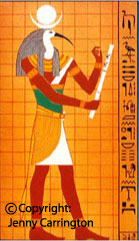 Throughout the old Pagan world, priest/scribes of the Thoth school were at work modifying, codifying, and unifying languages. They created alphabets. They created words. They "gave names to things that formerly had none." In addition to being linguists, scribes, and wordsmiths, they were mathematicians, scientists, and astronomers. The tower they built "whose top may reach unto heaven" was an astronomical instrument for measuring the movements of the heavens.
Throughout the old Pagan world, priest/scribes of the Thoth school were at work modifying, codifying, and unifying languages. They created alphabets. They created words. They "gave names to things that formerly had none." In addition to being linguists, scribes, and wordsmiths, they were mathematicians, scientists, and astronomers. The tower they built "whose top may reach unto heaven" was an astronomical instrument for measuring the movements of the heavens.
Babylon was an economic powerhouse of the ancient world. The "Babel of tongues" that was Babylon was the social and cultural center of a diverse civilization. The temples and schools of Babylon were like the MIT, Oxford, Harvard, UCLA, and Stanford of their day. Students and teachers from all over the world congregated there. To the illiterate barbarian tribesmen who pulled down the tower, Babylon was a great evil because they were excluded from its benefits. But Babylon didn't confuse their tongues. They were already confused.
"The island of New Guinea can boast of no less than one thousand languages, an estimated one fifth of world's languages." "Many of these languages have fewer than 5,000 speakers, some as few as 500 or less."
The first International Conference on New Guinea Languages and Linguistics, 1995.
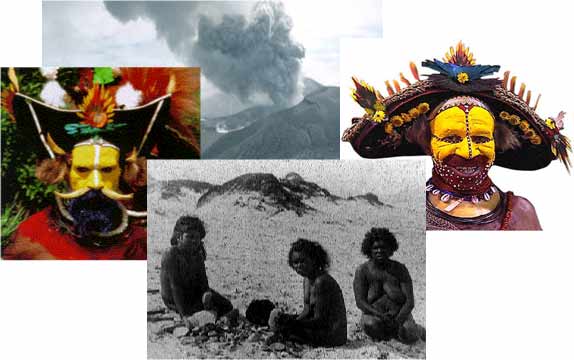
There are 5000 - 6000 languages spoken in the world today. New Guinea is an island 463,000 square kilometers in size. It has a population of 4,200,000 people. Those four million people speak one-fifth of the world's languages. Those few people speak so many languages because they have lived isolated from the world and isolated from each other for so long. Before Thoth, the whole world was like New Guinea. Before the dawn of agrarian civilization, with the cities and large social units that agriculture can support, the whole world was divided into small language groups like New Guinea.
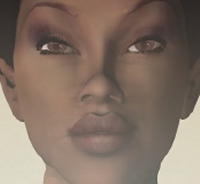
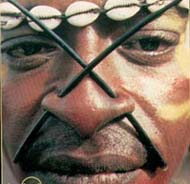
We are all children of Earthmother Isis. We can have a WorldCulture civilization that leaves out no part of humanity without forcing people to give up their diverse cultures. We can have a visual universal language that will enable people to communicate across those linguistic and cultural barriers that now divide us, without forcing people to give up their native languages.
Resurrect Isis. Her language is universal language. Her message is universal love.
|
Reader responses are invited. |
Return to Home Page . . . Return to Table of Contents Hub
Links to related topic pages:
Visual Language . . . Tower of Babel . . . Alphabet Page I